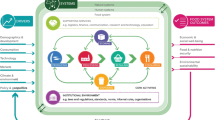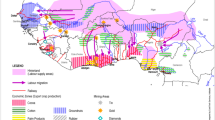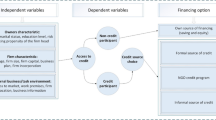Abstract
Gender has been broadly acknowledged to play an essential role in a household’s food security. However, most of the existing studies have assessed the potential contribution of gender to food security based on sex disaggregation only (women vs. men). We revisit the relationship between gender and food security by focusing simultaneously on two core elements of gender: access to and control over productive resources. We use primary data collected from 295 households randomly selected in two districts in Benin to fit a generalized structural equation model. Our results showed four types of households: households without women’s access and control of resources, households with women’s access to capital only, households with women access to all resources and households with access and control over resources. Households with access and control over resources are the majority of the sample of households surveyed, while households without women’s access and control of resources occupied 5.9% of the households surveyed. Households, where women have full access to and control over resources, are less exposed to food insecurity. This result holds true in households where women contribute to food expenditures. The expenditures are on products with high nutritional value. Women who control resources with no expenditure on food, like men, did not influence household food insecurity. We recommend particular attention to women’s empowerment within their households to reduce food insecurity in developing countries.


(Source: Authors, 2020)

Similar content being viewed by others
References
Agarwal, B. (2018). Gender equality, food security, and the sustainable development goals. Environmental Sustainability, 2018(34), 26–32.
Alston, M., & Akhter, B. (2016). Gender and food security in Bangladesh: The impact of climate change. Gender, Place & Culture, 23(10), 1450–1464. https://doi.org/10.1080/0966369X.2016.1204997
Bezu, S., & Holden, S. (2014). Demand for second-stage land certification in Ethiopia: Evidence from household panel data. Land Use Policy, 41(2014), 193–205. https://doi.org/10.1016/j.landusepol.2014.05.013
Cafiero, C., Viviani, S., & Nord M. (2018). Food security measurement in a global context: The Food Insecurity Experience Scale; FAO, 9p
Campbell, B. M., Vermeulen, S. J., Aggarwal, P. K., Corner-Dolloff, C., Girvetz, E., Loboguerrero, A. M., Ramirez-Villegas, J., Rosenstock, T., Sebastian, L., Thornton, P. K., & Wollenberg, E. (2016). Reducing risks to food security from climate change. Global Food Security, 11, 34–43. https://doi.org/10.1016/j.gfs.2016.06.002
Cochran, W. G. (1963). Sampling technique (2nd ed.). John Wiley and Sons Inc.
Diémé, M., Ibrahima, B. A., & Tamba, M. (2022). genre, paix et developpement local, le role des organisations feminines dans le maintien de la paix en casamance. Revue Economie, Gestion Et Société, 1(34), 2458–6250.
Donkor, E., Onakuse, S., Bogue, J., & Carmenado, I. L. R. (2017). The impact of the presidential cassava initiative on cassava productivity in Nigeria: Implication for sustainable food supply and food security. Cogent Food & Agriculture, 3(1), 1368857. https://doi.org/10.1080/23311932.2017.1368857
Doss, C., Summerfield, G., & Tsikata, D. (2014). Land, gender, and food security. Feminist Economics, 20(1), 1–23. https://doi.org/10.1080/13545701.2014.895021
Doss, C., Meinzen-Dick, R., Quisumbing, A., & Theis, S. (2018). Women in agriculture: Four myths. Global food security, 16, 69–74. https://doi.org/10.1016/j.gfs.2017.10.001
Egah, J., Baco, M. N., Akponikpè, P. B. I., Djenontin, A. J., Moutouama, F. T., Tossou, R., Fatondji, D., Koala, S., Assogba, P., Kimaro, A. A., & Sokpon, N. (2014). Impacts of water and soil conservation strategies on households’ food security in North West of Benin. International Journal of Agricultural Science Research, 3(4), 196–202.
FAO. (2016). Methods for estimating comparable rates of food insecurity experienced by adults throughout the world. FAO.
FAO, IFAD, UNICEF, WFP & WHO. (2018). The State of food security and nutrition in the World 2018. Building climate resilience for food security and nutrition. Rome, FAO.
FAO, & Commission de la CEDEAO (2018). Profil National Genre des Secteurs de l’Agriculture et du Développement Rural – Bénin. Série des Evaluations Genre des Pays. Cotonou. pp 148.
FAO and ECOWAS Commission (2018). National gender profile of agriculture and rural livelihoods – Nigeria. Country gender assessment series, Abuja. 92.
FAO, FIDA, OMS, PAM & UNICEF. (2020). L’État de la sécurité alimentaire et de la nutrition dans le monde 2020. Transformer les systèmes alimentaires pour une alimentation saine et abordable. Rome, FAO, 352p. https://doi.org/10.4060/ca9692fr
Floro, M. S., & Swain, R. B. (2013). Food security, gender, and occupational choice among urban low-income households. World Development, 42, 89–99. https://doi.org/10.1016/j.worlddev.2012.08.005
Galiè, A., Teufel, N., Korir, L., Baltenweck, I., Webb Girard, A., Dominguez-Salas, P., & Yount, K. M. (2018). The women’s empowerment in livestock index. Social Indicators Research, 142(2), 799–825. https://doi.org/10.1007/s11205-018-1934-z
Galiè, A., Teufel, N., Webb Girard, A., Baltenweck, I., Dominguez-Salas, P., Price, M. J., Jones, R., Lukuyu, B., Korir, L., Raskind, I. G., Smith, K., & Yount, K. M. (2019). Women’s empowerment, food security and nutrition of pastoral communities in Tanzania. Global Food Security, 23, 125–134. https://doi.org/10.1016/j.gfs.2019.04.005
Gnisci, D. (2016). Women’s roles in the West African Food System: Implications and prospects for food security and Resilience, West African Papers, No. 03, OECD Publishing, Paris.
Grace, D., et al. (2018). Food safety: Food safety metrics relevant to low and middle income countries, food safety.
HLPE, 2017. Nutrition and Food Systems
Holden, S. T., & Ghebru, H. (2016). Land tenure reforms, tenure security and food security in poor agrarian economies: Causal linkages and research gaps. Global Food Security, 10, 21–28. https://doi.org/10.1016/j.gfs.2016.07.002
IFC (2016). UKM yang dimiliki wanita di Indonesia: Kesempatan emas untuk institusi keuangan lokal (IFC Working Paper). Retrieved from https://adoc.pub/ukm-yang-dimiliki-wanita-di-indonesia-kesempatan-emasuntuk-.html
INSAE, & PAM (2017). Analyse Globale de la Vulnérabilité, de la Sécurité Alimentaire et Nutritionnelle (AGVSA), pp. 173.
Jakobowicz, E. (2007). Contributions aux modèles d’équations structurelles à variables latentes (Doctoral dissertation, Conservatoire national des arts et metiers-CNAM).
Kassie, M., Ndiritu, S. W., & Stage, J. (2014). What determines gender inequality in household food security in Kenya? Application of exogenous switching treatment regression. World Development, 56, 153–171. https://doi.org/10.1016/j.worlddev.2013.10.025
Kc, H., Shrestha, M., Pokharel, N., Niraula, S. R., Pyakurel, P., & Parajuli, S. B. (2021). Women’s empowerment for abortion and family planning decision making among marginalized women in Nepal: a mixed method study. Reproductive Health, 18(1), 1–11. https://doi.org/10.1186/s12978-021-01087-x
Kefi-Chatzichamperi, E., & Chatzichamperis, I. (2020). Sport in hellenic military academies: bridging gender theories in hellenic military academies through sport. European Journal of Physical Education and Sport Science, 6(1), 95–105. https://doi.org/10.5281/zenodo.3659287
Larson, J. B., Castellanos, P., & Jensen, L. (2019). Gender, household food security, and dietary diversity in western Honduras. Global Food Security, 20, 170–179. https://doi.org/10.1016/j.gfs.2019.01.005
Lavigne Delville, P., & Robin, J. (2019). Aménagement de bas-fonds, politique de l’aménageur et recompositions foncières. Le cas de Lofing au Burkina Faso. Cahiers Agricultures, 28(18), 1–8. https://doi.org/10.1051/cagri/2019018
Lourme-Ruiz, A., Dury, S., & Martin-Prével, Y. (2016). Consomme-t-on ce que l’on sème ? Relations entre diversité de la production, revenu agricole et diversité alimentaire au Burkina Faso. Cahiers Agricultures, 25, 160033. https://doi.org/10.1051/cagri/2016038
Maharani, C. D., Moeliono, M., Wong, G. Y., Brockhaus, M., Carmenta, R., & Kallio, M. (2019). Development and equity: A gendered inquiry in a Swidden landscape. Forest Policy and Economics, 101, 120–128. https://doi.org/10.1016/j.forpol.2018.11.002
Malapit, H. J. L., Kadiyala, S., Quisumbing, A. R., Cunningham, K., & Tyagi, P. (2015). Women’s empowerment mitigates the negative effects of low production diversity on maternal and child nutrition in Nepal. The Journal of Development Studies, 51(8), 1097–1123. https://doi.org/10.1080/00220388.2015.1018904
Mango, N., Makate, C., Mapemba, L., & Sopo, M. (2018). The role of crop diversification in improving household food security in central Malawi. Agriculture & Food Security, 7, 7. https://doi.org/10.1186/s40066-018-0160-x
Marlow, S., & Dy, A. M. (2018). Annual review article: Is it time to rethink the gender agenda in entrepreneurship research ? International Small Business Journal, 36, 3–22. https://doi.org/10.1177/0266242617738321
Mezgebo, K., Lema, T. B., & Neela, S. (2021). Food variety, dietary diversity scores and dietary quality of complementary foods consuming by 6–24 months aged children in Jimma town, southwest Ethiopia. Nutrition & Food Science, 51(2), 323–344. https://doi.org/10.1108/NFS-02-2020-0033
Mkandawire, E., Mentz-Coetzee, M., Mangheni, M. N., & Barusi, E. (2021). Enhancing the Glopan Food Systems Framework by Integrating Gender: Relevance for Women in African Agriculture. Sustainability, 13(15), 8564. https://doi.org/10.3390/su13158564
Molden, D., Verma, R., & Sharma, E. (2014). Gender equality as a key strategy for achieving equitable and sustainable development in mountains: The case of the Hindu Kush–Himalayas. Mountain Research and Development, 34(3), 297–300. https://doi.org/10.1659/MRD-JOURNAL-D-14-00064
Monzani, S. (2015). Du sexe, de l’identité et autres transgressions du genre. Cahiers De Psychologie Clinique, 2(45), 15–40. https://doi.org/10.3917/cpc.045.0015
Neumann, M., Varano, E., Chawla, S., Gomanie, N. N., & Mehta, K. (2022). Empowering middle-aged women to bolster food security in their communities. IEEE Global Humanitarian Technology Conference (GHTC), 2022, 361–368. https://doi.org/10.1109/GHTC55712.2022.9911023
Onyeneke, R. U., Nwajiuba, C. A., Igberi, C. O., Umunna Amadi, M., Anosike, F. C., Oko-Isu, A., Munonye, J., & Adeolu, A. I. (2019). Impacts of caregivers’ nutrition knowledge and food market accessibility on preschool children’s dietary diversity in remote communities in Southeast Nigeria. Sustainability, 11(6), 1688.
Padmaja, R., Pramanik, S., Pingali, P., Bantilan, C., & Kavitha, K. (2019). Understanding nutritional outcomes through gendered analysis of time-use patterns in semi-arid India. Global Food Security, 23, 49–63. https://doi.org/10.1016/j.gfs.2019.04.001
Pérez-Farinós, N., Villar-Villalba, C., Sobaler, A. M. L., Saavedra, M. Á. D. R., Aparicio, A., Sanz, S. S., Robledo de Dios, T., Castrodeza-Sanz, J. J., & Anta, R. M. O. (2017). The relationship between hours of sleep, screen time and frequency of food and drink consumption in Spain in the 2011 and 2013 ALADINO: A cross-sectional study. BMC Public Health, 17(1), 1–12. https://doi.org/10.1186/s12889-016-3962-4
Plessz, M., & Le Pape, M. C. (2019). The political dimension of consumption work, or political consumption as work: how French households do gatekeeping on the food market. Food, Culture & Society, 22(3), 334–353. https://doi.org/10.1080/15528014.2019.1582251
Price, M., Galie, A., Marshall, J., & Agu, N. (2018). Elucidating linkages between women’s empowerment in livestock and nutrition: A qualitative study. Development in Practice, 28(4), 510–524. https://doi.org/10.1080/09614524.2018.1451491
Riley, L., & Crush, J. (2023). Transforming urban food systems in secondary cities in Africa. UK: Springer International Publishing.
Roussel, P., Durrieu, F., Campoy, E., & El Akremi, A. (2005). Chapitre 11. Analyse des effets linéaires par modèles d’équations structurelles: Management des ressources humaines: Méthodes de recherche en sciences humaines et sociales (pp. 297–324). De Boeck Supérieur. https://doi.org/10.3917/dbu.rouss.2005.01.0297
Taruvinga, A., Muchenje, V., & Mushunje, A. (2013). Determinants of rural household dietary diversity: The case of Amatole and Nyandeni districts, South Africa. International Journal of Development and Sustainability, 2(4), 2233–2247.
Tesliuc, E., Grigoras, V., & Stanculescu, M. (2015). Background study for the national strategy on social inclusion and poverty reduction 2015–2020. pp. 424.
Ullman J. B. & Bentler P. M. (2013). Chapter 23 structural equation modeling. In: Weiner I. B., (Eds.) Handbook of Psychology, Second Edition, pp. 661–690.
van Noordwijk, M., Duguma, L. A., Dewi, S., Leimona, B., Catacutan, D. C., Lusiana, B., Öborn, I., Hairiah, K., & Minang, P. A. (2018). SDG synergy between agriculture and forestry in the food, energy, water and income nexus: Reinventing agroforestry? Environmental Sustainability, 34, 33–42. https://doi.org/10.1016/j.cosust.2018.09.003
Von Braun, J., Afsana, K., Fresco, L. O., & Hassan, M. H. A. (2023). Science and innovations for food systems transformation. Springer International Publishing.
WFP (2018). Examen stratégique national "Faim Zéro" au Bénin à l'horizon 2030/ Final report. 192p.
Workicho, A., Belachew, T., Feyissa, G. T., Wondafrash, B., Lachat, C., Verstraeten, R., & Kolsteren, P. (2016). Household dietary diversity and Animal Source Food consumption in Ethiopia: Evidence from the 2011 Welfare Monitoring Survey. BMC Public Health, 16, 1192. https://doi.org/10.1186/s12889-016-3861-8
Acknowledgements
We thank the Académie de recherche et d’enseignement supérieur (ARES) of the Belgian Government for the financing of our postdoctoral stay at the Université Catholique de Louvain.
Author information
Authors and Affiliations
Corresponding author
Ethics declarations
Conflict of interest
The authors declared that they have no conflict of interest.
Additional information
Publisher's Note
Springer Nature remains neutral with regard to jurisdictional claims in published maps and institutional affiliations.
Dear Rosaine, you left us in an unprecedented accident on January 29, 2023, but your works continue to speak of you. May your soul rest in peace.
Rights and permissions
Springer Nature or its licensor (e.g. a society or other partner) holds exclusive rights to this article under a publishing agreement with the author(s) or other rightsholder(s); author self-archiving of the accepted manuscript version of this article is solely governed by the terms of such publishing agreement and applicable law.
About this article
Cite this article
Egah, J., Yegbemey, R.N., Menouni, A. et al. Can gender-equitable access to and control over resources improve rural household food security? Case study in West Africa. GeoJournal 88, 5013–5029 (2023). https://doi.org/10.1007/s10708-023-10894-7
Accepted:
Published:
Issue Date:
DOI: https://doi.org/10.1007/s10708-023-10894-7




